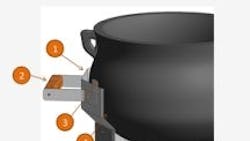Berkeley's newest invention: More efficient stove for Ethiopians
Berkeley Lab researchers, led by senior scientist Ashok Gadgil, have designed an efficient cookstove specifically for women living in makeshift camps for displaced persons in Darfur. Each Berkeley-Darfur Stove uses two to three times less wood than traditional stoves.
Now Berkeley Lab has modified its Darfur stove for Ethiopia. One twist: Instead of financing the scale-up of stove dissemination through charities, project sponsor World Vision intends for the pilot project to take advantage of the world carbon market. Given that each stove has a lifetime of about five years, and that one ton of carbon sells for about $14 on the carbon exchange in Europe, a stove that costs less than $25 to produce can generate $140 in income.
Berkeley Lab scientists first sought to understand what kind of food, fuels, utensils and pots Ethiopians use.
They found some critical differences with the cooking process in Darfur. Not only was the food different, but also Ethiopian women sometimes use cow dung as a fuel, which produces more smoke than wood. Their pots were also far more varied in size and shape than in Darfur.
Plus, Ethiopian women make coffee several times a day—both brewing and roasting the beans—requiring supports in the stove to accommodate coffee pots and roasting pans. After studying Ethiopian pots and pans, Berkeley Lab scientists modified the pot supports and handles of the Berkeley-Darfur Stove. They made another important discovery: that households in Ethiopia take pride in their clean bare-earth floors — what a Westerner might call a “dirt floor.”
Back at Berkeley Lab, stove designers gathered all the feedback and came up with a pilot design. A factory in India has built 20 stoves per this design, complete with ash pans, which will be shipped to Ethiopia for more extended testing by World Vision. The goal is to distribute another 1,000 for a second round of testing in the fall if the tests results from the first 20 are acceptable.
Meanwhile, Berkeley Lab scientists continue to test the Berkeley-Ethiopia stove, measuring the rate of fuel burning and indoor emission levels. They have just concluded the water boiling test, a general test that is useful for comparing different stoves and cooking methods, though it will not necessarily provide emission levels for a specific type of food. The test involves heating the stoves from a cold start and a hot start, each time bringing 5 liters of water to a boil then holding it on simmer for 45 minutes. The Berkeley Lab scientists compared their results to results obtained by World Vision from performing the same test with an open fire and with three other fuel-efficient stoves being considered for dissemination in Ethiopia.
“In a nutshell, our stoves are slower but more efficient than the other stoves. That is, it may take a bit longer to boil equivalent amounts of water, but we will use less wood doing so,” says one researcher.
Berkeley Lab is also benchmarking the large variety of cookstoves available for Haitian earthquake refugees. Although a number of scientists and nonprofit organizations are working on fuel-efficient cookstoves for Haiti, no generally accepted test protocols and reliable and credible test results exist for comparing the fuel-efficiency of one stove versus another.
Berkeley Lab is a U.S. Department of Energy (DOE) national laboratory located in Berkeley, California. It conducts unclassified scientific research and is managed by the University of California for the DOE Office of Science. Visit our website at http://www.lbl.gov.
Additional information on the Darfur Stoves Project: http://darfurstoves.org/
